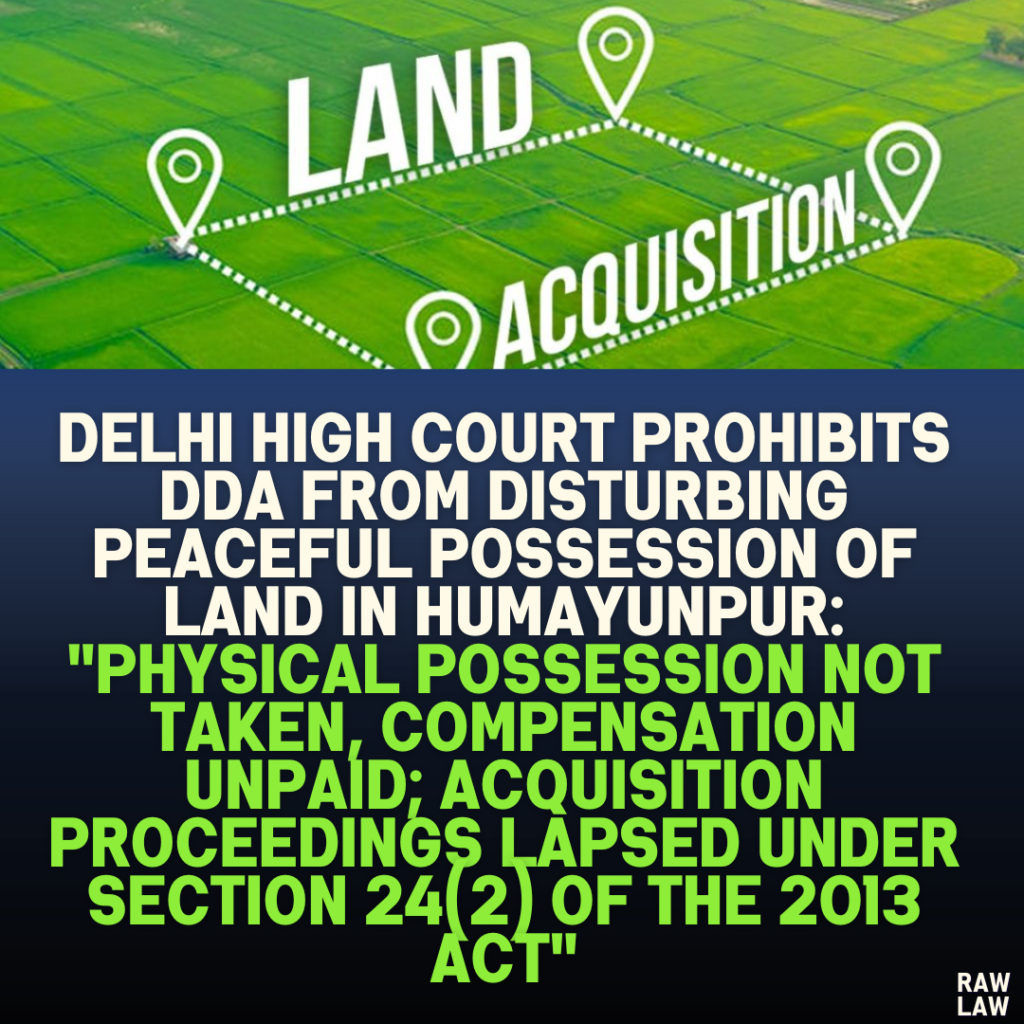Court’s Decision
The Delhi High Court issued a writ of prohibition against the Delhi Development Authority (DDA), restraining it from disturbing the peaceful possession of 1 Bigha 1 Biswas of land in Khasra No. 39, Humayunpur, Delhi. The court declared that the acquisition proceedings under the Land Acquisition Act, 1894, had lapsed under Section 24(2) of the Right to Fair Compensation and Transparency in Land Acquisition, Rehabilitation, and Resettlement Act, 2013. The court also held that the DDA must adhere to due process if fresh acquisition proceedings were initiated.
Facts
- Land Details: The petitioners, heirs of the original landowners, claimed ownership of 1 Bigha 1 Biswas in Khasra No. 39, Village Humayunpur, Delhi. They asserted settled possession of the land.
- Acquisition Proceedings:
- The land was notified for acquisition under Section 4 of the Land Acquisition Act, 1894, in 1957.
- A declaration under Section 6 of the 1894 Act was issued in 1964.
- Award No. 2121 was passed in 1968, including the subject land.
- Lapse of Acquisition:
- The petitioners contended that neither physical possession of the land had been taken nor compensation paid.
- They invoked Section 24(2) of the 2013 Act, arguing that the acquisition proceedings had lapsed.
- Prior Judicial Ruling:
- In a related case (WP(C) 6820/2015), the Division Bench of the Delhi High Court had declared that the acquisition had lapsed, as the conditions under Section 24(2) of the 2013 Act were met.
- Subsequent Developments:
- Despite the lapse, the DDA continued to attempt eviction and demolition on the land, leading to the present writ petition.
Issues
- Did the acquisition proceedings under the 1894 Act lapse as per Section 24(2) of the 2013 Act?
- Were the actions of the DDA in attempting eviction and demolition lawful?
Petitioner’s Arguments
- Lapse of Acquisition: The petitioners argued that the acquisition proceedings had lapsed since no physical possession had been taken, and no compensation was paid despite the award being issued over five decades ago.
- Violation of Natural Justice: The DDA’s actions, including demolition attempts, were contrary to judicial orders and violated principles of natural justice.
- Judicial Precedent: The petitioners relied on prior rulings, including the 2015 High Court judgment and Supreme Court decisions, which supported their claim of lapse under Section 24(2).
Respondent’s Arguments
- Scope of Section 24(2): The DDA argued that the Supreme Court in Indore Development Authority v. Shailender allowed liberty to reinitiate acquisition within one year.
- Committee Deliberations: The DDA stated that a committee was examining whether review petitions should be filed in similar cases. However, this process was delayed pending a Constitution Bench decision.
Analysis of the Law
The court analyzed Section 24(2) of the 2013 Act, which states that acquisition proceedings under the 1894 Act lapse if:
- Compensation was not paid, and
- Physical possession was not taken,
within five years preceding the commencement of the 2013 Act.
The court referred to the following precedents to interpret Section 24(2):
- Pune Municipal Corporation v. Harakchand Misirimal Solanki (2014): Held that failure to pay compensation or take possession within the stipulated period results in lapse.
- Indore Development Authority v. Shailender (2018): Allowed reinitiation of acquisition proceedings within one year, subject to conditions.
- Govt. of NCT of Delhi v. K.L. Rathi Steels Ltd. (2024): Resolved disputes over interpretation of Section 24(2) and reaffirmed principles established in earlier cases.
Precedent Analysis
The court relied heavily on established principles from the aforementioned cases, especially those clarifying the lapse of acquisition proceedings. It emphasized that no review or reconsideration could alter the lapse once the conditions of Section 24(2) were met.
Court’s Reasoning
- Lapse of Acquisition: The court concluded that the acquisition proceedings had lapsed since neither possession was taken nor compensation paid for the land.
- Judicial Precedent: The earlier High Court ruling declaring the lapse was binding.
- DDA’s Actions: The court held that the DDA’s continued attempts to interfere with the petitioners’ possession were unlawful and violated prior court orders.
Conclusion
The court granted the writ petition, issuing a writ of prohibition against the DDA. It restrained the DDA from interfering with the petitioners’ possession or initiating demolition proceedings without due process.
Implications
- Reinforcement of Section 24(2): The judgment reaffirms the protection granted under the 2013 Act to landowners where compensation is unpaid or possession unacquired.
- Due Process: It emphasizes the importance of due process in land acquisition disputes.
- Judicial Precedent: The ruling underscores adherence to judicial declarations and highlights the binding nature of prior decisions.
